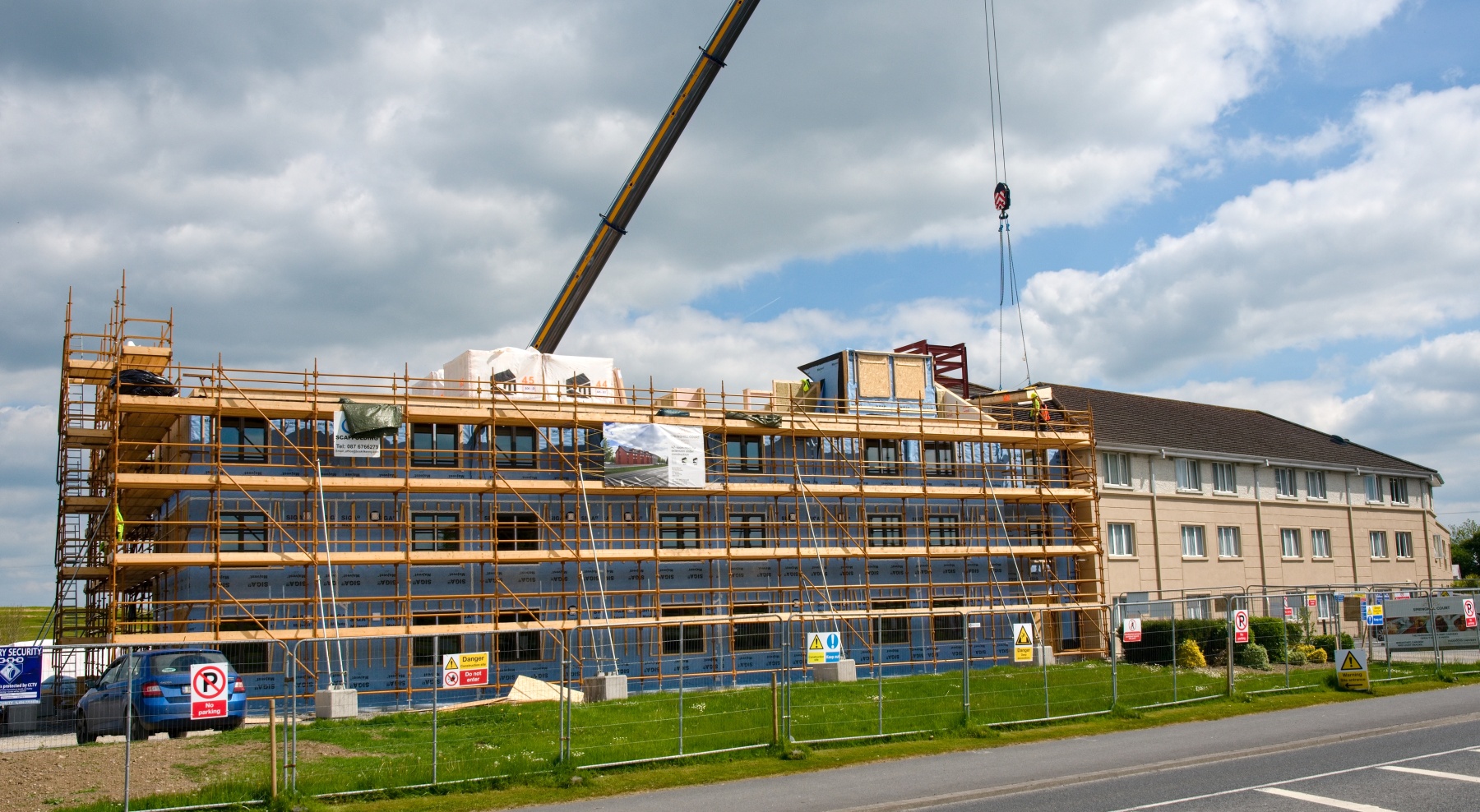
Rendering of the intended extension to Springhill Court Hotel
An extension to the value of €6,000,000 has commenced at the Springhill Court Hotel. The extension will see 45 new bedrooms erected using modular construction. A refurbishment of the hotel is also in the pipeline.
The above-ground construction began on April 15; now a month on, construction has reached both 3rd floor and roof level.
The manufacture of the hotel extension is being overseen by Irish-Latvian company BalticWood Pavasars Group. The Group operates across seven countries and is comprised of 110 employees ranging from engineers and architects to modular trade specialists, with a number of subdivisions including Pavasars Modular Housing and Pavasars Windows Factory.

The group is led by Inguss Pavasars and Peter O’Donnell. Peter is based in Kilkenny and Dublin, and is also chief operations officer (COO). Certified by the European Organisation for Technical Assessment (EOTA), the company produces high-quality timber-frame buildings, wood and wood-aluminum windows and bespoke. Using modular construction, they construct and furnish buildings on the factory floor and ship to them directly to the site.
The factory for BalticWood Pavasars Group is located in Latvia. The buildings manufactured there are transported to Ireland by ship and are brought to their intended sites by truck.
Peter and Inguss explain the process of modular construction. “The factory professional team of architects, engineers and cost consultants communicate with the team in Ireland via WhatsApp and Microsoft Teams. Our customers present them with the drawings designed by their own architect, and from those we manage the process from the customer's initial drawings through to agreement of budgets, manufacturing drawings, and on to the completed projects.
“We review the initial project with the customer and their designers to optimise their ideas for modular construction. Quality control, financial management and budget control are at the core of the process.
“The next step is manufacturing. Budgeting is carried out before this, and once the client agrees and makes note of any additions they might seek, the price is locked in. The day the contract is signed, all the materials are pre-ordered and the prices for all materials are locked in. This ensures that there are no variations or cost creep, unless the customer adds to the scope.”
“As manufacturing of the building begins in the factory, we begin the siteworks. Once complete, we transport the building to the site, crane it into position, and then finalise work on site. BalticWood Pavasars are helping change construction from being a slow, messy process to one that is faster, of higher quality, and a cost competitive process.”
“The wood we use is slow-grown, Baltic pine; it’s rock solid. There's a vapour membrane in our timber frames; there's a totally different feel to a timber-framed room. It’s about breathability; everything has to be allowed to breathe,” says Peter.
“For the Springhill Court Hotel, we're installing WiFi-enabled smart electric heating, which will bring tempered air into the room through a small filter and let it out through the extractor in the bathrooms.
“Over a six hour period, there will be new air circulated through the room. It uses less electricity than air conditioning, but more importantly it’s very health-conscious, as the walls are breathable and there's new air being filtered into each room all the time.”
The method of modular construction has proven to be cost efficient for customers. “The extensive air tightness and insulation involved in BalticWood Pavasars' standard specification ensures that little or no energy is used to heat the average house,” says Inguss. “Our Swedish-level specification renders the house virtually passive for the Irish climate.”
Peter encourages the use of dry materials in the construction industry, advising that it's a much better alternative to cement and blockwork. “We need to clean up the industry, to get wet trades out of construction,” says Peter. “Cement products, bricks in particular, absorb water. They're not a dry material; they create dampness. However, houses can be finished as render on cement board, or with brick slips on cement board.
There are also environmental merits to modular construction. “If you cut down a renewable tree in a managed forest, you're storing carbon,” says Peter. “If you then put that tree into a building, you're also storing carbon. Then, you can plant another tree, and 20 years later, the tree is back again.”
“It's great to see the Springhill Court Hotel being so forward-looking in its approach to a major construction,” concludes Peter.
Subscribe or register today to discover more from DonegalLive.ie
Buy the e-paper of the Donegal Democrat, Donegal People's Press, Donegal Post and Inish Times here for instant access to Donegal's premier news titles.
Keep up with the latest news from Donegal with our daily newsletter featuring the most important stories of the day delivered to your inbox every evening at 5pm.